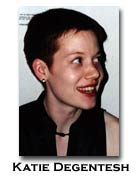 Freud
in Brooklyn: Poems by Joanna Fuhrman
Freud
in Brooklyn: Poems by Joanna FuhrmanJuly 2000, Hanging Loose Press, Brooklyn, NY (softcover, 68 pp.)
by Katie Degentesh
Self-consciousness is a strange phrase of Americanese, one that can serve as reference to someones worst hang-ups or to his or her best qualities. Theres the typical sentence, I couldnt bring myself to talk to her; I was too self-conscious -- and then theres the heightened sense of self-consciousness that stars in the blurbs of so many book jackets.
Writers who can play to both sides of this coin may be rare, but it would seem that Joanna Fuhrman is such a writer. Her first collection of poems, Freud in Brooklyn, is a collection thats simultaneously introspective and entertaining, and exhibits a voice thats equally at home in silly tones or honest, serious ones.
The book begins with a section in which the poet keeps herself pretty much Out of the Picture. The only us here belongs to a bunch of brains hanging around swapping chordates by the five and dime, and the few Is and wes belong mainly to germs and dreamers. Ms. Fuhrman has a talent for narration, and displays it well, particularly in the title poem, which features a Freud who travels to Brooklyn to see Coney Islands Dreamland Park just as it starts to burn. But my favorite line from this section comes from the fragmented Blue Poem #6: Some words are heavier than others. Try carrying it.
Poking fun at Yiddish in Shticking with the Shtotics, the second section of the book, the poet tackles the subjects of family and Jewishness with humor. Even her descriptions of a grandmothers funeral in Afterimage carry honest, funny details: The rest just watch each other to see who is crying, who is looking / at the ground, what kinds of shoes you can wear with black.
For me, most of the books gems are seeded in the books final section, Personal Ad, which contains many of the most personal and the most experimental pieces, mainly in the form of uniquely hilarious love poems that manage to conflate love and art or love and nature as freshly as they do love and vegetables. You could have been more / than the egg in the tempera. / O you, who will always be a you, mourns the speaker in A History of Western Art. Ms. Fuhrman is at her funniest and most inventive in these poems. Freud reappears, if only inferentially, in the opening lines of Window as Camouflage:
|
If either of us mentions the others name accidentally in the midst of some argument about the problems of third-world development it doesnt mean that the name is a window, allowing the view of a banana-colored parrot in an avocado tree. |
Thus begins a poem about subtext which itself carries a subtext -- and yet somehow manages to keep from being either obscure or facetious. The result is a charming, teasingly obvious yet inventive verbal dexterity, wielded by a poet who is very much her own person, and knows it.
BIO: Katie Degentesh was a Stadler Younger Fellow at Bucknell in 1995 with Joanna Fuhrman. Her poems have appeared in numerous publications, including Fourteen Hills and The Washington Post. She lives in San Francisco, where she is an editor for the lit mag 6,500 and has a day job as poetry and fiction editor for the Internet publisher MightyWords.com.